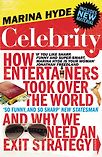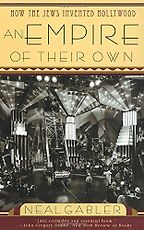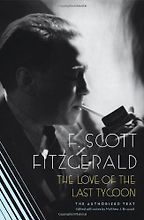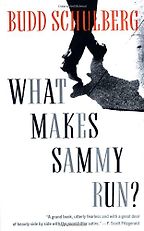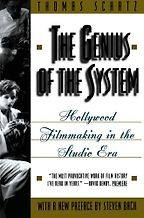Tell me about your first of your choices for best books on Hollywood.
I’ll start with An Empire of Their Own, because it’s just so difficult for us to understand what Hollywood was like then, particularly for these guys who were either first generation, or immigrant German, or East European Jews, who’d come largely from running things like nickelodeon outfits on the East Coast, and ended up creating this extraordinary confection out in California. Bearing in mind that they weren’t allowed in the country clubs and things like that, they ended up trying to suppress their Jewishness in almost every way.
Even in a town as new as Hollywood?
Absolutely. Because remember that what they were doing was effectively bringing into mass circulation an art form – what we now regard as an art form – that at the time was regarded as frightfully déclassé. Smart people went to the ballet and opera, and what the poor and lower middle classes did with their time didn’t matter. But these men in Hollywood had a vision and were creating this product that was loved by everybody of all different backgrounds. They were very intent that those people should have something for themselves, but they became very obsessed with elevating the public and doing something great with movies.
Get the weekly Five Books newsletter
They ended up more or less creating a new establishment, because Hollywood was a place that they could really make their own. There wasn’t an awful lot there: at the time LA was a relatively small town, but it had masses of real estate. Having started out as fur traders and so on they built these studios that were really little principalities: you just think my God, these journeys that these people go on! They created the art form of the American 20th century, starting with these little pictures where people were just amazed by movement, or really early talkies, and which everyone had access to.
Tell me about the next book on Hollywood, the Fitzgerald.
It’s about a studio executive called Monroe Stahr. Stahr is based on Irving Thalberg, who was the right-hand man to Louis B Meyer at MGM and brought Fitzgerald out to write for him. Fitzgerald never really did make anything much at the movies, but he wrote this wonderful book which is his last and, though it’s sadly unfinished, I think would have been maybe his best. Fitzgerald went out to Hollywood in the way all the bright writers did. If you’d had a big hit on the East Coast then they’d get you out to write for the movies. It never really worked – but it was a part of Hollywood’s desperate need to prove itself. It was like a status symbol: one doesn’t read the novel, one buys the novelist.
The narrator of the book is a young ingenue, the daughter of a studio head (possibly based on Meyer’s daughter), who says there’s only six or seven men in the history of movies who’ve been able to hold the whole equation of pictures in their head at the same time, and Monroe Stahr was one of them. It’s this idea that it’s not just the people out there in the dark, but it’s about taste and staying ahead. Thalberg was one of those incredibly gifted people who was able to see the public taste and capture it and work its levers about six months before it happened. There’s a great chapter in the book where she just outlines the producer’s day, which is a real insight into that time. It’s not insidery: it manages to be a story that everybody can understand, and I suppose we’re all fascinated by the movies. Certainly everybody was in those times, and the way Fitzgerald writes about it you can’t not be. These days it’s not so easy to be fascinated by Jennifer Aniston movies, but it wasn’t very difficult to get like that about Lana Turner movies.
What Makes Sammy Run?
It’s a novel by Budd Schulberg about a copyboy who’s worked his way up from absolutely nothing to become an incredibly grasping self-motivated amoral movie producer. I think it was really based on Jerry Wald who was a Warners executive and then an independent who made lots of fantastic movies. Louis Meyer of MGM was appalled, and told Schulberg’s parents – Schulberg was the son of a movie exec – you’ve got to deport this son of yours because he’s going to fuel anti-Semitism. Hollywood became probably more establishment than they needed to have been in many ways, because they were terrified of anti-Semitism. Meyer was almost more anti-Communist than McCarthy, and Schulberg ended up being blacklisted as a Communist, partly because Hollywood was always terrified of (I think actually terribly wet about) being seen as harbouring this stuff. It was really horrible. Schulberg was a fascinating guy, a great writer: he wrote On the Waterfront and worked on John Ford’s wartime documentary unit. He went with the deputation to arrest Leni Riefenstahl, primarily to get her to identify people from footage. He died only about a month ago.
And The Genius of the System?
It’s about how gradually the stars became more savvy: they started saying I want to do this or that kind of movie, because people don’t like to be told they’re one sort of star. But people didn’t want to see Bogart going insane for example: he’s a cynic, and also a romantic, and you want to see that Warners’ style. That’s something Schatz deals with – that all the major studios developed a very specific house style. MGM was the kind of massive, prestige house – they famously said they never made B-grade movies – whereas Warners had this reputation for gang movies, and Jimmy Cagney was their big star. Universal developed the horror genre which was cheap, and as a result the players that were contracted to these studios fitted those house styles. But the stars become more important, and eventually the directors did too, largely down to Hitchcock, who inspired auteurs like Spielberg, Cimino and Coppola.
I suppose the story of his book is that by the 70s these really incredibly well-oiled machines were looked at as stifling creativity and hemming in artists and making them all play to type and so on. Everybody thought that these auteurs who came along with these huge productions, and really just used studios as somewhere they rented space, were the right thing, that they were the future and that movies should be made like this and that the old ways never produced anything good – but that’s nonsense. The studios turned out some of the greatest movies in history: if you look at the period from the 30s through the 40s, maybe even to 1950, the product they turned out is incredible, really high calibre, and amazing stars emerged from it.
And then you end up with something like Heaven’s Gate.
Heaven’s Gate was not just a flop, it collapsed United Artists – the studio that was founded by DW Griffiths, Mary Pickford, and Douglas Fairbanks, and it’s ridiculous that one man and one movie could do that. For its faults, the studio system wouldn’t have let that happen. Steven Bach, the author of this book, was the head of production at United Artists and he writes just beautifully: you can’t believe he was a movie executive. It’s a forensic account of how they take a gamble on this one guy [director Michael Cimino] on a movie that was originally budgeted at six million dollars and ended up costing 39 million dollars. Shooting went over schedule by at least a year and the final cut of the movie was four hours long.
Does Bach give any idea of why they ploughed so much money into Cimino?
It’s extraordinary, because when you open the book you think, I can’t wait to see what this guy’s got to say, because how could it be anyone’s fault but his? But it’s a story of just getting in deeper and deeper and it speaks a lot for the atmosphere of the times that this kind of stuff seemed rational. It’s one of those things which is incremental, when each time something happens it seems rational, but Bach is so clever at stepping outside of the times and saying, looking back this was obviously ridiculous.
It’s a great anatomy of the most famous flop in movie history, and to have a guy on site who can write like this! He’s very good at creating this mood around every decision that’s taken. But this was a time when a lot of these studios were starting to be owned by conglomerates – United Artists was owned by an airline – and people who are obviously not movie people start to be in charge. As a result many studios, particularly MGM, were slow to pick up on the threat and potential of television. Hollywood looked down on it as a medium in the same way, slightly ironically, as the snobs on the East Coast had originally looked down on their medium – they thought it slightly vulgar.
In my view we’re living in a golden age now where actors want to be in TV dramas, and you sense that Steven Spielberg would actually rather be making Band of Brothers than Saving Private Ryan, because it’s 12 hours of story, and that’s probably more interesting for him than getting a film off the ground, which is inevitably shorter.
Five Books aims to keep its book recommendations and interviews up to date. If you are the interviewee and would like to update your choice of books (or even just what you say about them) please email us at editor@fivebooks.com
Five Books interviews are expensive to produce. If you've enjoyed this interview, please support us by donating a small amount.

